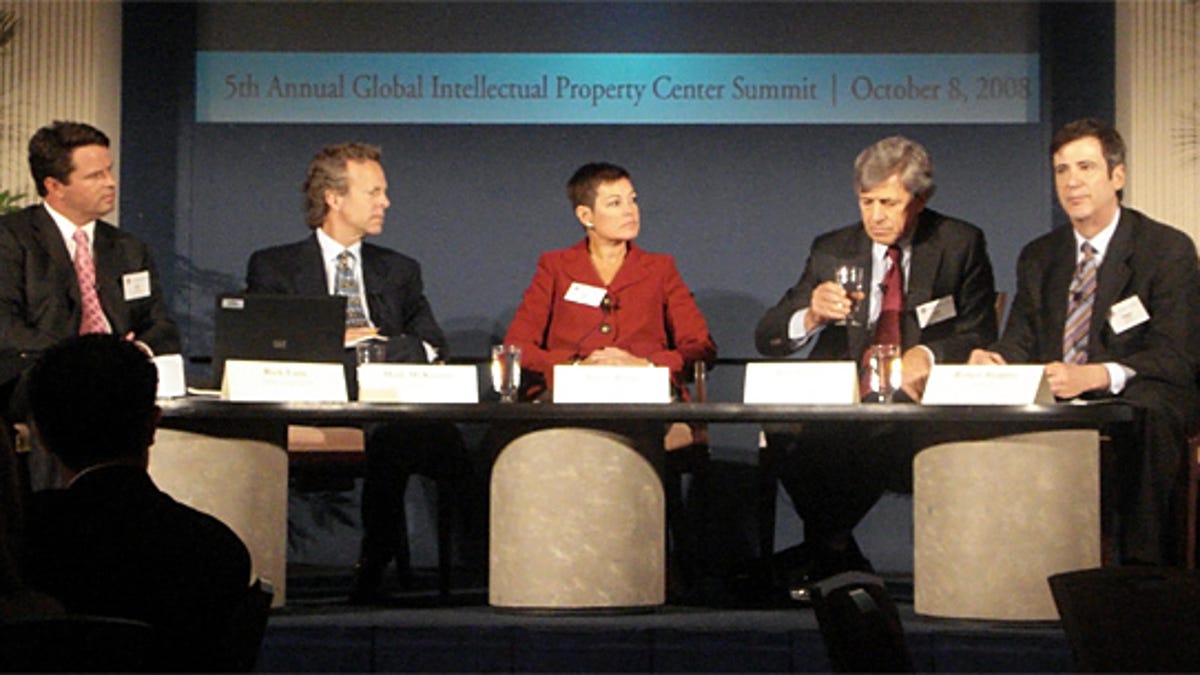Business, labor urge Bush to sign RIAA-backed copyright bill
Business representatives discuss how to get governments and consumers on their side of the intellectual property debate.

WASHINGTON--With only five days left for President Bush to decide whether to sign into law a controversial copyright bill, business lobbyists and even the AFL-CIO are pushing for it to become law.
Most bills to expand copyright law are bipartisan--one aimed at file-swappers and prerelease movies in 2005 comes to mind--and the so-called Prioritizing Resources and Organization for Intellectual Property Act is no exception. Sens. Patrick Leahy, a Democrat, and Arlen Specter, a Republican, are the sponsors, and it enjoys the support of the Recording Industry Association of America.
But the Pro-IP Act is unusual because the Bush administration threatened a veto last month. It's been subsequently amended, and the changes are likely to assuage the administration's concerns, but the U.S. Commerce Department told CNET News that it is still reviewing the revised language.
While industries have been defensively adapting to a globalized economy and game-changing technologies, intellectual property holders are on the offense. The messages from companies like Procter & Gamble and NBC Universal are being carefully tailored to reveal the benefits of bolstering IP protections--whether it's a promise to U.S. politicians of more jobs, better products for consumers, or faster development for leaders abroad.
Industry representatives discussed how to craft those messages, and what obstacles stand in their way, on Wednesday at the U.S. Chamber of Commerce's fifth annual intellectual property summit.
So far, its message to the U.S. government appears to be working. The Pro-IP Act passed unanimously in the Senate and saw bipartisan support in the House.
In the case of the entertainment industry, it is imperative to educate people about "the ramification of (IP) theft to the people who work on the sets, in makeup, even selling concessions"--not just the highly paid actors and producers, said Rick Lane, senior vice president for government affairs at News Corp.
Industries have coordinated their message with union leaders to emphasize that IP protection is, at its core, a jobs issue.
"America's workers are also being victimized by a tidal wave of counterfeiting...and digital theft...(that) threatens the well-being of the U.S. economy, endangers our citizens, and steals our jobs," John Sweeney, president of the AFL-CIO wrote in The Hill, a newspaper ubiquitous around the Capitol.
The message seems to be sinking in not only with congressmen but also with the presidential candidates. Wednesday's panelists see the presidential election's emphasis on green technology as a positive sign.
"That's a recognition of the role of innovation and its tie to the U.S. economy," said Rick Cotton, executive vice president and general counsel of NBC Universal. "This is not a low-cost manufacturing economy--what we have to offer is our innovation."
The need to protect and stimulate innovation is also emphasized with foreign governments, especially those like Brazil that have implemented compulsory licenses, which forces IP holders to grant a state rights to use the intellectual property in question at a set rate.
"We're actually trying to spread that gospel in lots of different countries," said Jon Soderstrom, president of the Association of University Technology Managers. "What we see is people making assertions about the flaws (of IP protection), like hindering the flow of research--none of which is true. The evidence shows it's actually promoting innovation."
Lane said the U.S. should be "using the pulpit of the presidency to explain the importance of IP to other economies."
Creating a favorable environment for IP holders involves convincing consumers as well as lawmakers that IP enforcement is worthwhile.
Encouraging consumers to veer away from bootlegged content simply requires "sending them cues," said Cotton.
NBC has had a great deal of success routing viewers of the Olympics and popular videos like SNL sketches to its own sites.
"That combination of ease of access and the desire of consumers to access content when, and how they want it," Cotton said, "have to go hand and hand, and then we see the possibility of continuing investment."
CNET's Declan McCullagh contributed to this report

